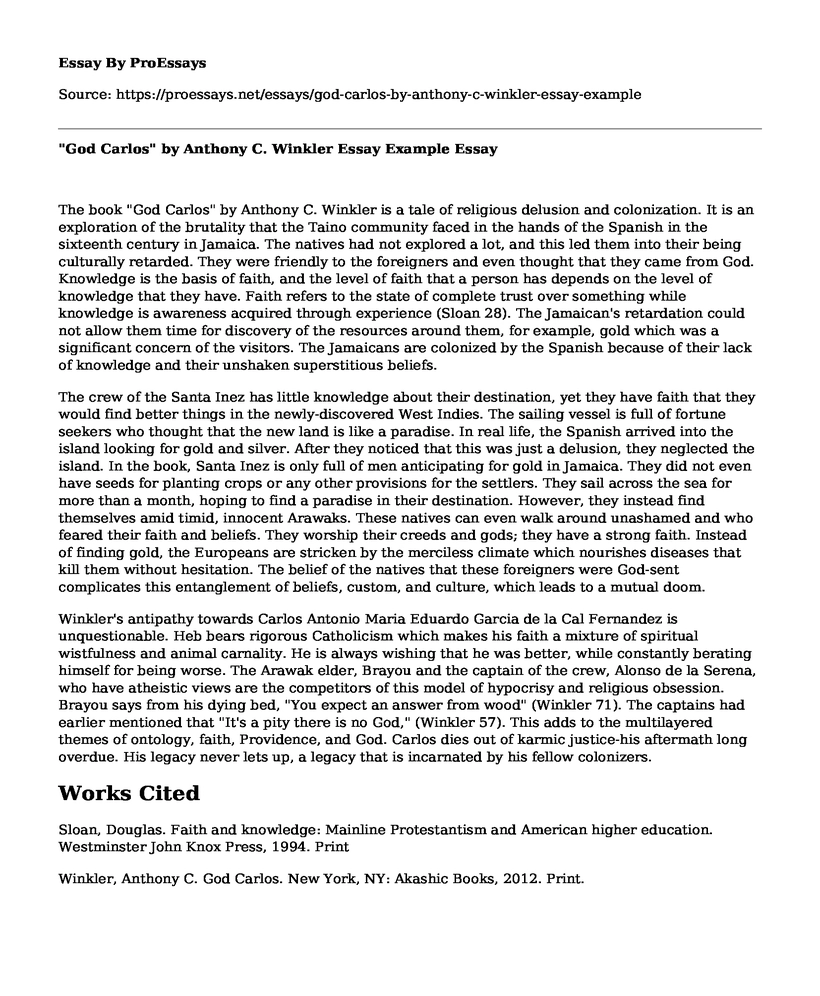The book "God Carlos" by Anthony C. Winkler is a tale of religious delusion and colonization. It is an exploration of the brutality that the Taino community faced in the hands of the Spanish in the sixteenth century in Jamaica. The natives had not explored a lot, and this led them into their being culturally retarded. They were friendly to the foreigners and even thought that they came from God. Knowledge is the basis of faith, and the level of faith that a person has depends on the level of knowledge that they have. Faith refers to the state of complete trust over something while knowledge is awareness acquired through experience (Sloan 28). The Jamaican's retardation could not allow them time for discovery of the resources around them, for example, gold which was a significant concern of the visitors. The Jamaicans are colonized by the Spanish because of their lack of knowledge and their unshaken superstitious beliefs.
The crew of the Santa Inez has little knowledge about their destination, yet they have faith that they would find better things in the newly-discovered West Indies. The sailing vessel is full of fortune seekers who thought that the new land is like a paradise. In real life, the Spanish arrived into the island looking for gold and silver. After they noticed that this was just a delusion, they neglected the island. In the book, Santa Inez is only full of men anticipating for gold in Jamaica. They did not even have seeds for planting crops or any other provisions for the settlers. They sail across the sea for more than a month, hoping to find a paradise in their destination. However, they instead find themselves amid timid, innocent Arawaks. These natives can even walk around unashamed and who feared their faith and beliefs. They worship their creeds and gods; they have a strong faith. Instead of finding gold, the Europeans are stricken by the merciless climate which nourishes diseases that kill them without hesitation. The belief of the natives that these foreigners were God-sent complicates this entanglement of beliefs, custom, and culture, which leads to a mutual doom.
Winkler's antipathy towards Carlos Antonio Maria Eduardo Garcia de la Cal Fernandez is unquestionable. Heb bears rigorous Catholicism which makes his faith a mixture of spiritual wistfulness and animal carnality. He is always wishing that he was better, while constantly berating himself for being worse. The Arawak elder, Brayou and the captain of the crew, Alonso de la Serena, who have atheistic views are the competitors of this model of hypocrisy and religious obsession. Brayou says from his dying bed, "You expect an answer from wood" (Winkler 71). The captains had earlier mentioned that "It's a pity there is no God," (Winkler 57). This adds to the multilayered themes of ontology, faith, Providence, and God. Carlos dies out of karmic justice-his aftermath long overdue. His legacy never lets up, a legacy that is incarnated by his fellow colonizers.
Works Cited
Sloan, Douglas. Faith and knowledge: Mainline Protestantism and American higher education. Westminster John Knox Press, 1994. Print
Winkler, Anthony C. God Carlos. New York, NY: Akashic Books, 2012. Print.
Cite this page
"God Carlos" by Anthony C. Winkler Essay Example. (2022, Nov 18). Retrieved from https://proessays.net/essays/god-carlos-by-anthony-c-winkler-essay-example
If you are the original author of this essay and no longer wish to have it published on the ProEssays website, please click below to request its removal:
- Midsummer Night's Dream, Character of Bottom
- Literary Essay Example: Theme of Death in The Raven and Frankenstein
- The Birthmark and its Relevance Today - Critical Essay
- Loving Parrots Poems Essay Example
- Trifles by Suzan Glaspell Essay Example
- Essay Sample on Myth: Then and Now
- King Lear by William Shakespeare Essay Example







